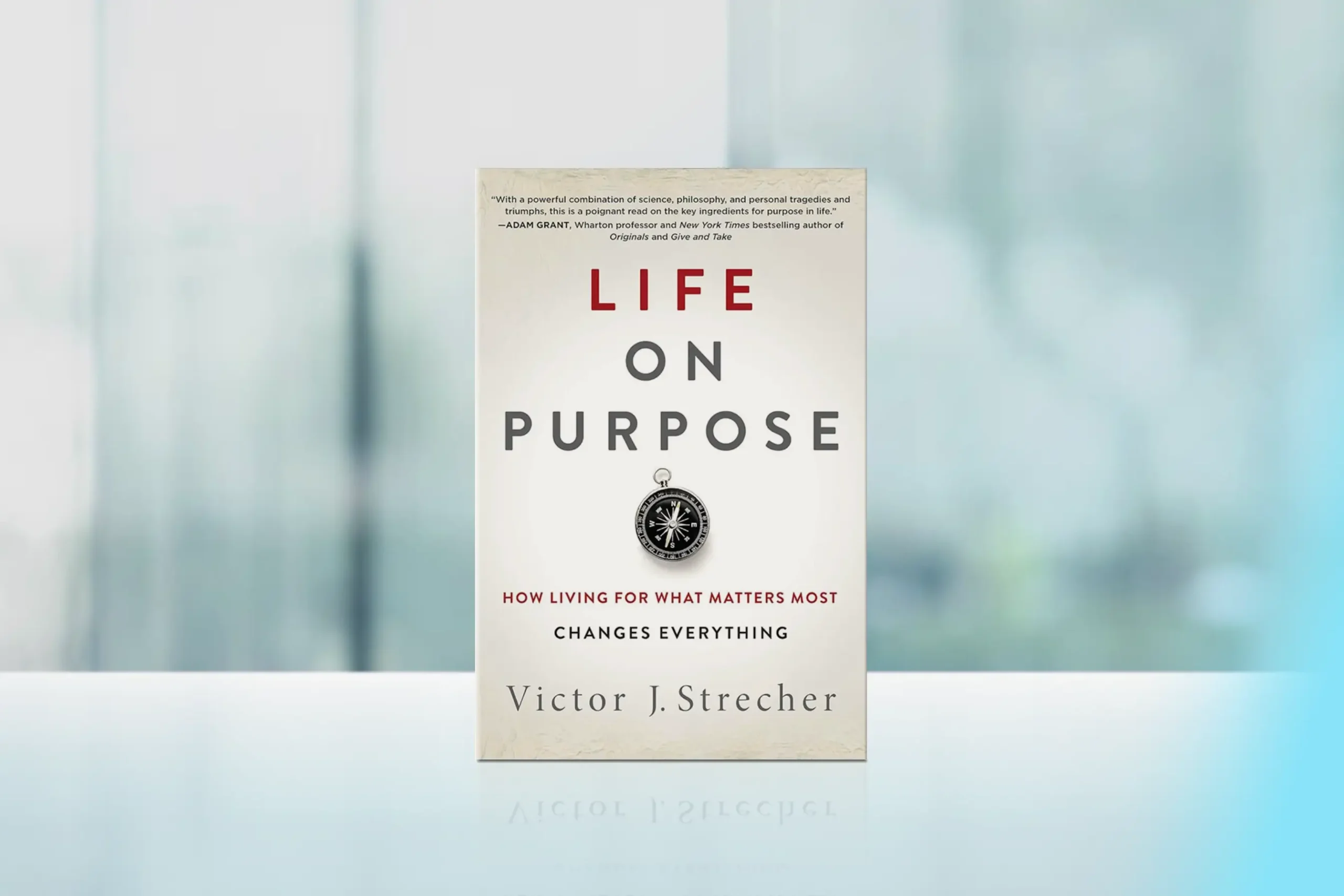Ever catch yourself wondering what really motivates you, or what gives your life deeper meaning beyond the usual routine? That’s where purpose comes in—it’s key to feeling fulfilled, happy, and grounded long-term. In this piece, we’ll dive into how to discover and live your life with purpose.
Inside this article:
1. The Importance of Purpose in Life
Purpose isn’t just a lofty ideal; it’s a practical force that can transform your life. Research from the University of Michigan has shown that people who live with purpose experience significant benefits that extend to nearly every aspect of well-being.
Key Benefits of Living with Purpose:
- Improved mental health and reduced rates of depression
- Greater resilience during challenging times
- Higher levels of overall life satisfaction
- Better physical health outcomes and longevity
What Research Tells Us:
- Strong purpose correlates with significantly lower depression, anxiety, and stress levels across diverse populations (Frontiers in Psychology)
- Over half of young adults (58%) report lacking meaning or purpose, which strongly links to higher anxiety and depression rates (Harvard study)
- People with strong purpose show 15% lower mortality risk than those without clear purpose (JAMA Network Open, 2019)
- Purpose improves physical health, behavioral outcomes, and resilience after setbacks (Research)
- In adolescents, purpose serves as a protective factor against depression and enhances overall mental wellbeing
Imagine waking up with a clear sense of why your day matters—feeling that energy that keeps you going through challenges. Many people just go through the motions in their careers, feeling empty despite checking all the boxes. Sound familiar?
The good news: purpose isn’t something you’re born with or find by accident. You can discover and develop it at any stage of life—whether you’re starting your career, raising a family, or enjoying retirement.
- Purpose provides measurable benefits for health, happiness, and success
- People with purpose tend to live longer, healthier lives
- You can discover purpose at any age
- Purpose is a skill you can learn, not a lucky discovery
As we explore The Power of Purpose-Driven Living, you’ll see how living with intention can revolutionize both your personal and professional life. It’s not just about finding a reason to get up in the morning; it’s about infusing every aspect of your life with meaning and direction.
Essential Insights: Purpose is a practical, learnable force offering measurable benefits for health, happiness, and success that can be discovered at any age or stage of life.
2. Understanding Purpose
Many people confuse purpose with passion, which can lead to frustration in their search for meaning. Making this distinction clear helps you avoid common pitfalls and better align your life choices with what truly matters to you.
Purpose vs. Passion
Your purpose is your reason for being – the driving force behind your actions and decisions. It answers the fundamental question: “Why do I do what I do?” While finding your purpose might seem abstract, understanding its core elements can make it more tangible and achievable.
Purpose
Why you do things
Your deeper motivation
Provides direction
Creates meaning
Often serves others
Tends to be enduring
Passion
What you love to do
Your enthusiasms and interests
Provides energy
Creates enjoyment
Often satisfies personal interests
May change frequently
Your purpose is your reason for being – the driving force behind your actions and decisions. It answers the fundamental question: “Why do I do what I do?” While finding your purpose might seem abstract, understanding its core elements can make it more tangible and achievable.
Purpose extends to multiple life domains
- Your relationships and family connections
- Your hobbies and personal interests
- Your community involvement and contributions
- Your career and professional life
The Resilience Factor: One of the most powerful aspects of purpose is its ability to help you overcome challenges. When you’re connected to your ‘why,’ you become more resilient in the face of setbacks. You can almost feel the strength that comes when your actions align with your deeper values – that quiet confidence that helps you navigate obstacles without losing sight of what matters most.
For a more in-depth exploration of purpose vs. passion, check out our article on Purpose vs. Passion: What’s the Difference and Why it Matters.
Core Concepts:Your purpose—the reason behind your actions that extends beyond career into all life domains—differs from passion and increases resilience against life’s challenges.
3. Debunking Myths About Purpose
As we explore purpose, it’s important to address common misconceptions. Many people believe finding purpose means discovering a singular, grand “calling” or that it must be directly tied to career success. These myths often lead to unnecessary pressure and disappointment.
Contrary to popular belief, purpose isn’t necessarily set in stone. It naturally evolves throughout our lifetime, adapting to new experiences and circumstances. What feels purposeful to us during our early 20s might shift as we enter our late 20s, 40s or 60s.
- Few of us wake up one morning with our life purpose fully formed. Purpose typically reveals itself gradually through exploration, reflection, and real-world experience.
- It’s never too late to discover or redefine your purpose, whatever stage of life you are in.
- Purpose doesn’t have to be tied to one big, life-altering goal. It might be about being a loving parent, a supportive friend, or a positive force in your community.
- Many people find their deepest sense of purpose later in life, drawing on a wealth of experiences and insights.
In our article Common Myths About Finding Your Purpose, we explore these misconceptions in detail. The truth is, purpose is far more flexible and multifaceted than many people realize.
Myth-Busting Truths: Purpose evolves gradually throughout your lifetime with no age limit for discovery and can be expressed in many ways beyond just career paths.
4. Finding Your “Why”
Now that we’ve cleared up some misconceptions, let’s explore how you can uncover your own sense of purpose. This process of self-discovery is deeply personal, but there are exercises and strategies that can help guide you.
Here are key strategies to get you started:
- Journaling: Set aside time to reflect on your experiences, values, and aspirations. Ask yourself: “What activities make me lose track of time?” or “When do I feel most alive and fulfilled?”
- Identify Your Core Values: Your values are a compass that can guide you towards your purpose. List your top 5-10 values and consider how they influence your decisions.
- Explore Your Passions: While passion and purpose aren’t the same, your passions offer clues about what’s meaningful to you. What topics or activities do you find yourself drawn to repeatedly?
- Reflect on Your Life Experiences: Consider the challenges you’ve overcome and the lessons you’ve learned. Often, our purpose is rooted in our unique life journey.
- Seek Feedback: Sometimes, others can see our strengths more clearly than we can. Ask trusted friends or mentors what they see as your unique gifts.
When many people first attempt to clarify their purpose, they look for grand, world-changing ideas. It’s not until they reflect on moments when they felt most fulfilled that purpose begins to take shape. What patterns might you discover if you looked back at when you felt most engaged?
Remember: The goal isn’t to create a perfect purpose statement immediately, but to gain insight into your deeper motivations and values.
In our comprehensive guide, Finding Your “Why”: Exercises to Uncover Your Life Purpose, we provide a range of tools to help you dig deep and identify what truly drives you.
Core principles: The process of purpose discovery involves exploring your personal values, reflecting on moments of deep engagement, and drawing meaning from your unique life experiences.
5. Different Stages of Life
As we journey through life, our sense of purpose often shifts and evolves. What feels meaningful in one phase of life might change as we enter new stages. This evolution is natural and leads to a richer understanding of our purpose over time.
Purpose can manifest differently at various life stages:
- In your 20s, purpose might revolve around exploration and self-discovery.
- In your 30s and 40s, purpose might shift towards building – whether that’s a career, family, or community.
- In your 50s and beyond, purpose often becomes more focused on legacy and giving back.
Your journey may differ from these patterns. Stay open to how your purpose evolves as you grow.
Major life changes like new jobs, parenthood, or retirement often trigger purpose reassessment, serving as catalysts for growth and realignment.
Embrace purpose as dynamic. Adjusting goals with new experiences shows growth, not inconsistency. Consider purpose as a compass rather than a destination—this perspective allows adaptation while honoring your core values.
We explore how purpose can manifest differently at various life stages in our article Purpose in Different Stages of Life: Adjusting as You Grow
Development Insight: As you move through different life stages and transitions, your purpose naturally evolves while core values often remain the foundation of your evolving purpose expression.
6. Purpose and Relationships
Living a purpose-driven life isn’t just about finding meaning in isolation. It’s about integrating that sense of purpose into all aspects of your life, including your relationships. When your connections align with your deeper sense of purpose, you’re likely to experience greater fulfillment.
Here are key points to consider:
Career Alignment:
- Reflect on how your current job aligns with your values and purpose. Even if it’s not a perfect match, can you find ways to bring more of your purpose into your work?
- Consider whether a career change might better serve your sense of purpose. This doesn’t always mean a drastic shift – sometimes small adjustments make a big difference.
- Look for opportunities to take on projects that resonate with your purpose, even if they’re outside your official job description.
Relationship Alignment:
- Communicate your sense of purpose with loved ones. Sharing your ‘why’ can deepen your connections.
- Seek out relationships that support your purposeful pursuits. Surrounding yourself with like-minded individuals can be motivating.
- Consider how you can incorporate your purpose into your role as a partner, friend, or family member.
Studies show that only about 25% of people discover their purpose through their career path alone. Most find that purpose emerges at the intersection of work, relationships, and personal growth.
Alignment doesn’t mean that every aspect of your life needs to directly serve your purpose. It’s about creating an overall sense of coherence across different areas of your life.
In our article on How to Align Your Purpose with Your Career and Relationships, we delve deeper into strategies for creating this harmony between career and relationships.
Relational Insights: Meaningful purpose integrates across all life domains including imperfect jobs and relationships that both support and express your deeper values.
7. Purpose in Everyday Life
Living with purpose doesn’t always mean making grand gestures. Often, it’s about infusing everyday actions with intention and meaning, allowing you to express your purpose consistently in routine aspects of life.
Here are practical ways to bring more purpose into your daily routine:
- Practice Mindfulness: Being fully present allows you to act with greater intention and awareness.
- Perform Random Acts of Kindness: Small gestures of kindness can be powerful expressions of purpose, especially when making a positive impact on others.
- Align Your Habits with Your Values: Review your daily habits and connect them to your larger purpose. Can you adjust them to better reflect what’s important to you?
- Find Purpose in Your Current Role: Even if your job isn’t your dream career, bring your unique strengths and values into your work.
- Engage in Lifelong Learning: Continuously expanding your knowledge can help you grow in alignment with your purpose.
It’s often in the smallest moments that we feel most connected to our “why.” Purpose touchpoints can appear in unexpected places if we remain attentive.
What small, meaningful action could you take today that aligns with what matters most to you? Feel the subtle shift that happens when you connect ordinary tasks to deeply cherished values.
We explore how to stay grounded in your purpose while navigating life’s disruptions in our article Navigating Life Transitions: How to Reassess Your Purpose During Major Changes,
Practical Applications: Mindfulness helps connect ordinary moments and small daily actions to deeper values, creating powerful expressions of purpose in routine activities.
8. Purpose in Life Transitions
Life is full of transitions – some expected, others unexpected. These periods of change often prompt us to reassess our sense of purpose.
Here are strategies for navigating purpose during major life changes:
- Embrace Change as an Opportunity: Rather than resisting change, view it as a chance to grow and potentially discover new aspects of your purpose.
- Reflect on Your Core Values: During transitions, reconnecting with your fundamental values can guide your decisions.
- Be Open to New Possibilities: Major life changes can reveal new paths that align with your purpose in unexpected ways.
- Practice Self-Compassion: Change can be challenging. Be patient with yourself as you navigate new terrain.
- Seek Support: Talking through your thoughts with trusted friends, family, or professionals can provide valuable perspective.
Many find purpose reassessment challenging. The familiar landmarks are suddenly changed or gone. This disorientation during major life transitions is common – that unsettling feeling when what once defined your purpose shifts.
What if these transitions aren’t obstacles to your purpose but doorways to its deeper expression? What if uncertainty is an invitation to discover new dimensions of purpose?
In our article Spirituality and Purpose: Finding Deeper Meaning in Life, we delve into how different spiritual and philosophical traditions view purpose, and how spiritual exploration can clarify life’s meaning.
Guidance: Life transitions trigger natural purpose reassessment where core values provide stability while changes often deepen rather than derail your purpose journey.
9. Spirituality and Purpose
For many people, purpose connects deeply with spiritual or philosophical beliefs. This connection often provides a framework for understanding your “why,” whether through traditional faith or a broader sense of spirituality.
Connecting with something larger than yourself might involve:
- Simple meditation or gratitude practices
- Reading philosophical works that resonate with you
- Participating in meaningful rituals or communities
- Reflecting on life’s bigger questions
Many are surprised to discover that even brief moments of stillness can create remarkable clarity about purpose. This spirituality doesn’t require organized religion—it might come through connection with nature, humanitarian values, or simply facing life’s challenges with awareness.
We explore how purpose can manifest differently at various life stages in our article Purpose in Different Stages of Life: Adjusting as You Grow
Reflectivion: Spiritual exploration and contemplative practices create space for clarity by connecting you to something larger than yourself, deepening your understanding of purpose.
10. Start Living Your Purpose Today
As we conclude our exploration of purpose, let’s recap some key points:
- Purpose is essential for a fulfilling life, contributing to happiness, health, and resilience.
- Your purpose is dynamic and can evolve throughout your life.
- Purpose extends beyond career – it infuses all aspects of your life with meaning.
- Anyone can discover and live their purpose at any point in life.
- Small, daily actions aligned with your values can be powerful expressions of purpose.
Now, it’s time to take action
Here are some next steps to start living your purpose today:
- Reflect on Your “Why”: Take time to journal about what truly matters to you. What values drive your decisions? What impact do you want to have?
- Start Small: Incorporate one small, purpose-driven action into your daily routine – a daily act of kindness or spending 10 minutes on a passion project.
- Share Your Journey: Talk to friends or family about your exploration of purpose. Sharing your thoughts can clarify your ideas and inspire others.
- Stay Open and Flexible: Remember that your sense of purpose may evolve. Remain open to new experiences and insights.
- Celebrate Progress: Acknowledge the moments when you feel aligned with your purpose, no matter how small they might seem.
Remember: discovering and living your purpose is a journey, not a destination. It’s never too late to start, and every step brings you closer to a more fulfilling, purpose-driven life.





